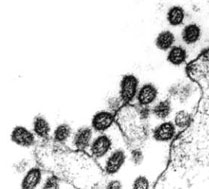Prof. Dr. Stephan Ludwig
NO positions via CiM-IMPRS in 2025
Dissecting the role of intracellular signaling processes in influenza virus infected cells

Cell Biology / Molecular Biology
Immunology
Microbiology / Virology / Infectiology
Signal Transduction
Influenza A virus infections remain a major public heath concern, both in its annual toll in death and debilitation and its potential to cause devastating pandemics. Viruses are cell-obligate parasites. Thus, to support their replication these pathogens extensively manipulate host-cell functions. At the same time infected cells activate defense mechanisms to fight the invader. These very dynamic processes are mostly mediated by different intracellular signaling cascades that regulate a variety of events in the infected cell including expression of cellular antiviral genes and cytokines. Thus, intracellular signaling events are at the tip of the delicate balance between efficient virus replication and effective antiviral responses and determine the outcome of a viral infection. We and others have identified a variety of influenza virus induced signaling pathways and functions in the infected cell. However, many questions have still to be answered, e.g. which signals trigger the dynamics of virus entry, nuclear export of the viral genome or virus budding. Regarding the underlying mechanism we analyse the dynamics of post-translational modification of viral and cellular proteins (phosphorylation, ubiquitinylation, glycosylation) and their role in the virus life cycle. This will also be explored in the context of cellular defense programs and their counteraction by viruses. Finally, the findings will be evaluated towards strategies to develop novel antiviral agents.

Vita
- 1981-1989: Studies in Chemistry, Giessen
- 1993: Graduation, Dr. rer nat.
- 1993-1994: Postdoc, Institute of Virology, University of Giessen
- 1994-2001: Research Assistant and Group Leader, University of Würzburg
- 2000: Habilitation
- 2001-2002: Assistant Professor, University of Würzburg
- 2002: Clinical Research Award, GlaxoSmithKline Foundation
- 2002-2004: Associate Professor, Institute of Molecular Medicine (IMM), University of Düsseldorf
- Since 2004: Full Professor and Director, Institute of Molecular Virology (IMV), ZMBE, University of Münster
- Since 2008: Coordinator of the FluResearchNet, a BMBF sponsored nationwide research network on zoonotic influenza
- Since 2009: Coordinator of the National Research Platform for Zoonosis Research
- Since 2009: Executive Editor of the journal "Biological Chemistry"
- Since 2012: Member of the Scientific Advisory Board, Ventaleon GmbH
- Since 2009-2016: Vice Rector of Research, University of Münster
- Since 2016: Chair of the Board, Atriva Therapeutics GmbH
- Since 2016: Member of the Scientific and Technical Council, Forschungszentrum Jülich (Helmholtz Association)
- Since 2016: Member of the Research Advisory Board of the Rector, University of Münster
Selected references
Nacken W, Wixler V, Ehrhardt C, Ludwig S. (2017) Influenza A virus NS1 protein-induced JNK activation and apoptosis are not functionally linked. Cell Microbiol, epub DOI: 10.1111/cmi.12721Liedmann S, Hrincius ER, Guy C, Anhlan D, Dierkes R, Carter R, Wu G, Staeheli P, Green D, Wolff T, McCullers JA, Ludwig S, Ehrhardt C (2014) Viral suppressors of the RIG-I-mediated interferon response are pre-packaged in influenza virions. Nat Commun 5, 5645.
Kathum OA, Schräder T, Anhlan, D, Nordhoff C, Liedmann S, Pande A, Mellmann A, Ehrhardt C, Wixler, V, Ludwig S (2016) Phosphorylation of Influenza A virus NS1 protein at threonine 49 suppresses its interferon antagonistic activity. Cell Microbiol 18:784-791
Börgeling Y, Rozhdestvensky TS, Schmolke M, Resa-Infante P, Robeck T, Randau G, Wolff T, Gabriel G, Brosius J, Ludwig S (2015) Evidence for a Novel Mechanism of Influenza Virus-Induced Type I Interferon Expression by a Defective RNA-Encoded Protein. PLoS Pathog. 11:e1004924
Köther K, Nordhoff C, Varga G, Bream JH, Gaestel M, Wixler V, Ludwig S (2014) MAPKAP Kinase 3 suppresses Ifng gene expression and attenuates NK cell cytotoxicity and Th1 CD4 T cell development upon influenza A virus infection. FASEB J 28, 4235-4246.
Liedmann S, Hrincius ER, Guy C, Anhlan D, Dierkes R, Carter R, Wu G, Staeheli P, Green D, Wolff T, McCullers JA, Ludwig S, Ehrhardt C (2014) Viral suppressors of the RIG-I-mediated interferon response are pre-packaged in influenza virions. Nat Commun 5, 5645.
Links
